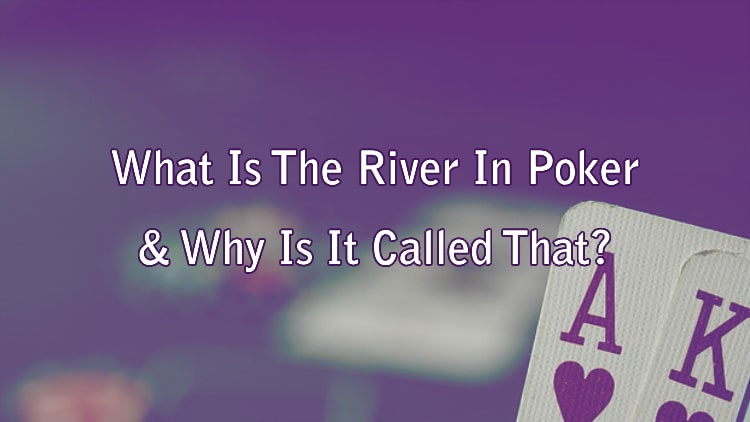
In any poker game, you hear players talk about the "river." But what exactly is it?
The river is the final community card dealt in games like Texas Hold'em and Omaha. It can make or break hands, adding entertainment and tension to the game. Understanding its role can potentially improve your strategies and enjoyment.
But why is it called the river? Read on to discover its origin and significance in the world of poker.
What Is The River In Poker?
In poker, the river is the term for the fifth and final community card dealt in games like Texas Hold'em and Omaha. After the flop and turn, the river card is the last opportunity for players to try and improve their hands before the showdown.
You make bets, call, or raise after the river is dealt, adding complexity and potential outcomes. Since it's the final card, decisions made here can define the ultimate winner of the hand.
Understanding the river and its placement in the game's structure is crucial for strategy. With your hand almost complete, you either strengthen your position or realise you're beaten.
Why Is It Called The River In Poker?
The term "river" in poker has an interesting history. Its origins are linked to early card games played on riverboats along the Mississippi River in the United States.
In these games, cheating was not uncommon. A dealer might hide a card up their sleeve and reveal it at a critical moment, known as "dealing from the bottom of the deck." When caught, the dealer could be thrown overboard into the river as punishment. Hence, the term "river" came to be associated with the final, decisive card of the game.
So, when you hear "the river" mentioned in poker, it’s a nod to these historical roots. Knowing this bit of trivia can add a fascinating layer to your understanding of the game.
How Do You Deal The River?
Dealing the river in poker follows a specific sequence. Here's a step-by-step guide to make it easy.
First, make sure the turn betting round is complete. All players should have placed their bets or folded.
Next, the dealer "burns" a card. This means taking the top card from the deck and placing it face down on the table, out of play.
Then, the dealer places the next card face up on the table. This is the river card.
At this point, players can assess their hands with the five community cards available. Another round of betting follows, giving players the final opportunity to bet, call, raise, or fold before the showdown.
Understanding this process can help you feel confident at the poker table. It’s simple, but important to get right for a smooth game.
Should You Bet On The River?
Deciding whether to bet on the river depends on several factors. Assessing your hand's strength is crucial. If you hold a strong hand, betting can help you maximise potential winnings. However, if your hand is weak, it might be wiser to check or fold to avoid any unnecessary losses.
Consider your opponents' actions. Have they been aggressive or passive throughout the game? Their betting patterns can sometimes provide clues about their hands.
The size of the pot is another important aspect. In some situations, it may be worth trying to win a smaller pot, while in others, a larger pot could justify a more aggressive bet.
Finally, consider how your opponents perceive you. If you've been playing conservatively, a well-timed bet on the river might successfully bluff them into folding.
Ultimately, whether you bet on the river is about weighing these different factors and making an informed decision that suits your strategy.
Odds of Hitting a Straight On The River
Calculating your odds of hitting a straight on the river can guide your betting decisions. If you’re missing just one card to complete a straight after the turn, you have eight potential outs (cards that can complete your straight).
The odds of hitting one of these outs on the river are roughly 17%. This percentage is derived from dividing the number of outs by the unseen cards remaining. For example, with eight outs and 46 unseen cards, the chance is 8 divided by 46.
Knowing these odds can help you decide whether to call, raise, or fold based on the potential outcome. Keep in mind that poker outcomes are random, and these calculations offer guidance, not certainty.
Play Real Money Poker Games Online
Playing real money poker games online can be an enjoyable way to test your skills and strategies against players from around the world. Various reputable online casinos in the UK offer a range of poker games, ensuring that you can find one that suits your skill level and preferences.
Before you begin, ensure the platform is licensed by the UK Gambling Commission (UKGC). This guarantees a fair and secure environment. Always set limits for yourself to keep your gambling responsible and fun. It's essential to play within your means and take regular breaks.
Many online platforms also offer resources to help you understand poker better. Take advantage of these tutorials or practice games to sharpen your skills before diving into real money games.
Conclusion
Understanding what the river is in poker and its historical background can potentially enhance your grasp of the game. Whether you’re playing casually or for real money, knowing these details can offer a more enjoyable experience. Remember to keep it fun and gamble responsibly!
*All values (Bet Levels, Maximum Wins etc.) mentioned in relation to these games are subject to change at any time. Game features mentioned may not be available in some jurisdictions.
